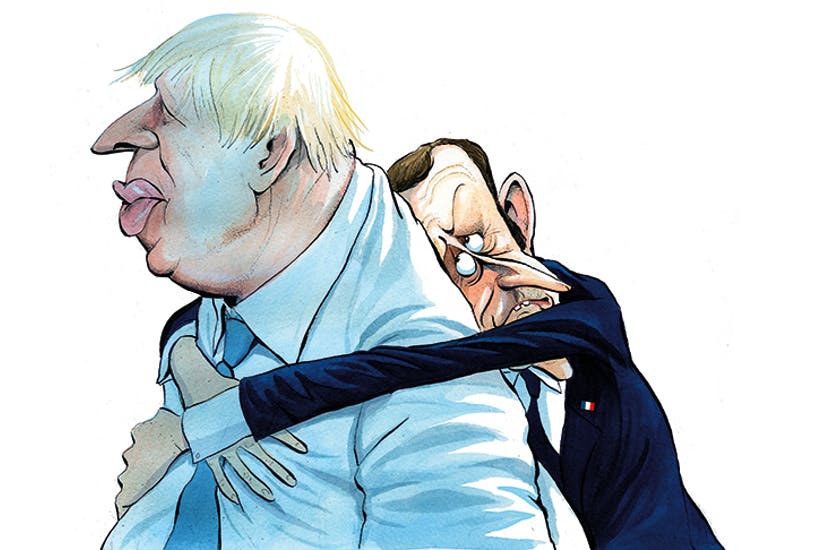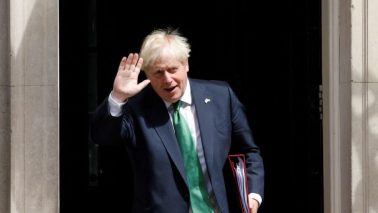Last Saturday the French president and British Prime Minister had a phone conversation about the pandemic and Brexit that received little coverage. But the subject matter highlights the extent to which the two leaders have troubles in common and solutions to share.
Emmanuel Macron and Boris Johnson have had a bad pandemic for similar reasons: lack of PPE, confused messaging on masks and quarantine, poor quality test and trace and unreliable Covid apps on phones (with the French prime minister and sundry ministers confessing not to have even downloaded the French version, which is unusable with a mere 2.6 million downloads).
Although British Covid death totals appear worse than the French at 42,875 versus 32,825, Santé Publique France’s statistics still do not include deaths at home, which according to the union of French general practitioners back in May was then approaching 10,000. Both leaders are criticised for dividing their states geographically: Boris south-north, Macron north-south (particularly the treatment of Marseille).
Both are facing hostility from within their parties. Both are suffering in the polls
Both are facing hostility from within their parties. Both are suffering in the polls. One might have thought that where Boris’s and Emmanuel’s woes part company would be on the crucial issue of time. Theoretically, Boris has five years before the next election, whereas Macron has only 18 months, with crucial departmental and regional elections next March. In reality, Boris is increasingly at risk from a coup within his party that could come in the New Year as a result of his handling of the pandemic. The idea of automatic Conservative party loyalty to a leader who delivered an 80 seat majority does not stand up to the historical example of Margaret Thatcher delivering a 102 seat majority in 1987 and being deposed three years later.
There isn’t much that Boris and Emmanuel can do for each other on coronavirus, but there is on Brexit. Both Boris and Macron need a deal politically, but for different reasons. Macron’s needs are domestic and foreign. Domestically France has much to lose from a no-deal, as various parliamentary commissions — which the French media fail to read — have pointed out.
France runs a massive trade surplus with the UK of €10 billion (£9 billion), notably in sectors with long traditions of militancy against the French state, from wine-making to agriculture. Fishing, though a tiny contributor to GDP and with small numbers working in the industry, is of that radical tradition. Much is situated in the Brittany region, whose militancy in recent times was on display with the 2013 violent bonnet rouge protests and then the gilets jaunes.
Though few in number, discontented French fishermen have form when it comes to blocking cross-Channel ports and the option of doing serious damage by blockading France’s prime trade port, Le Havre. The consequence of a no-deal for France, according to a report from the leading German Halle Institute for Economic Research released in February last year, is for 50,000 French job losses. Coming on top of Covid unemployment, which is predicted to be over 10 per cent by early next year, the impact on an already fractured French society would be devastating. A potential rival to Macron in 2022, his former very popular prime minister, Edouard Philippe, predicted only a month ago that France was facing ‘an economic, a health and a social storm’.
At the foreign policy level, Macron cannot risk a no-deal resulting from French intransigence on, say, fishing, when only nine of the 27 member states have an interest in fishing rights in UK waters. For someone with an ambition to lead Europe after Brexit, a further example of French egotism would not emblazon his banner as the self-appointed leader of Europe.
Boris also needs a deal, more so than six months ago, because of his poor handling of the pandemic. He badly needs a political win and getting Brexit done with a deal is the best scenario for his popularity while allowing him to move beyond Brexit.
However, a deal at any price could provoke a revolt from within the Conservative party and raise the prospect of Nigel Farage’s return. So both Macron and Boris need a reasonable Brexit deal to assuage the political impact of the pandemic. Each can scratch the other’s back on Brexit. Their political futures depend on it.







Comments